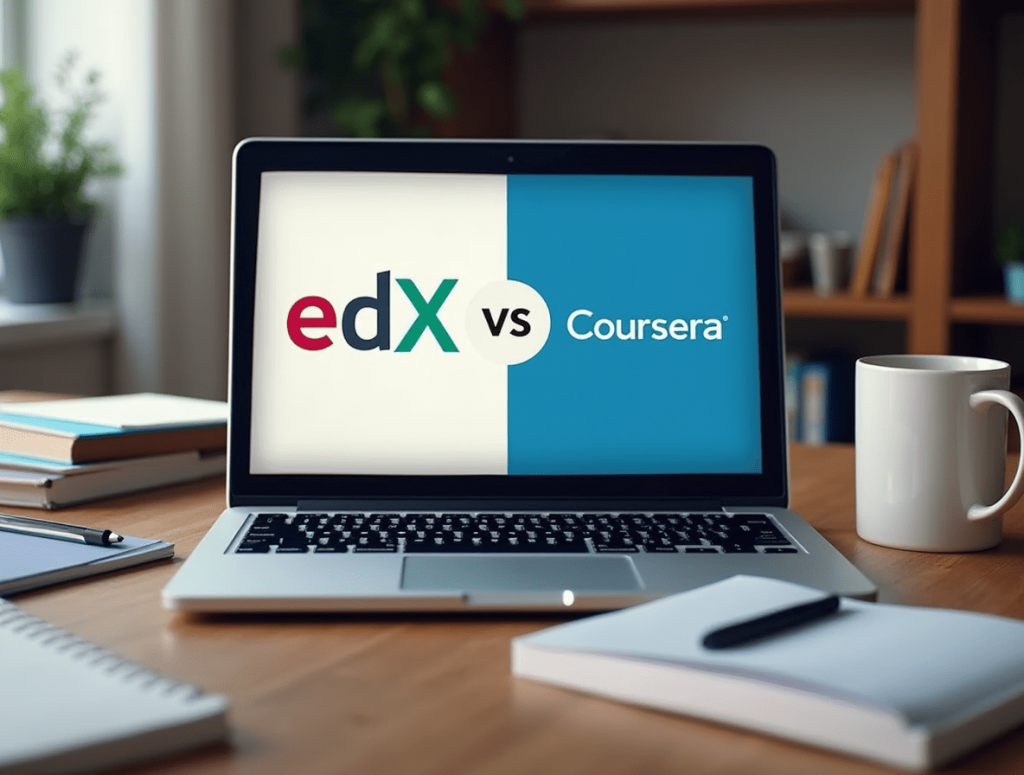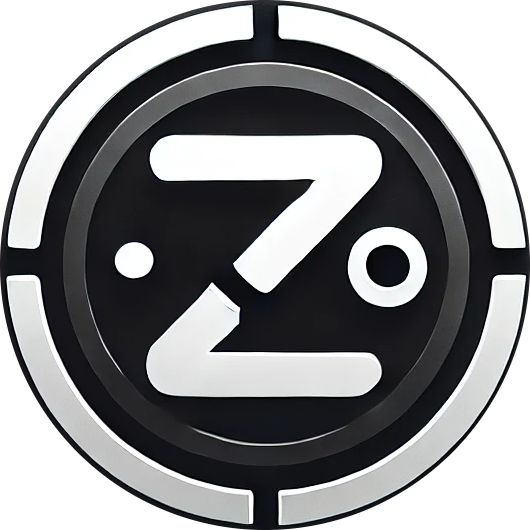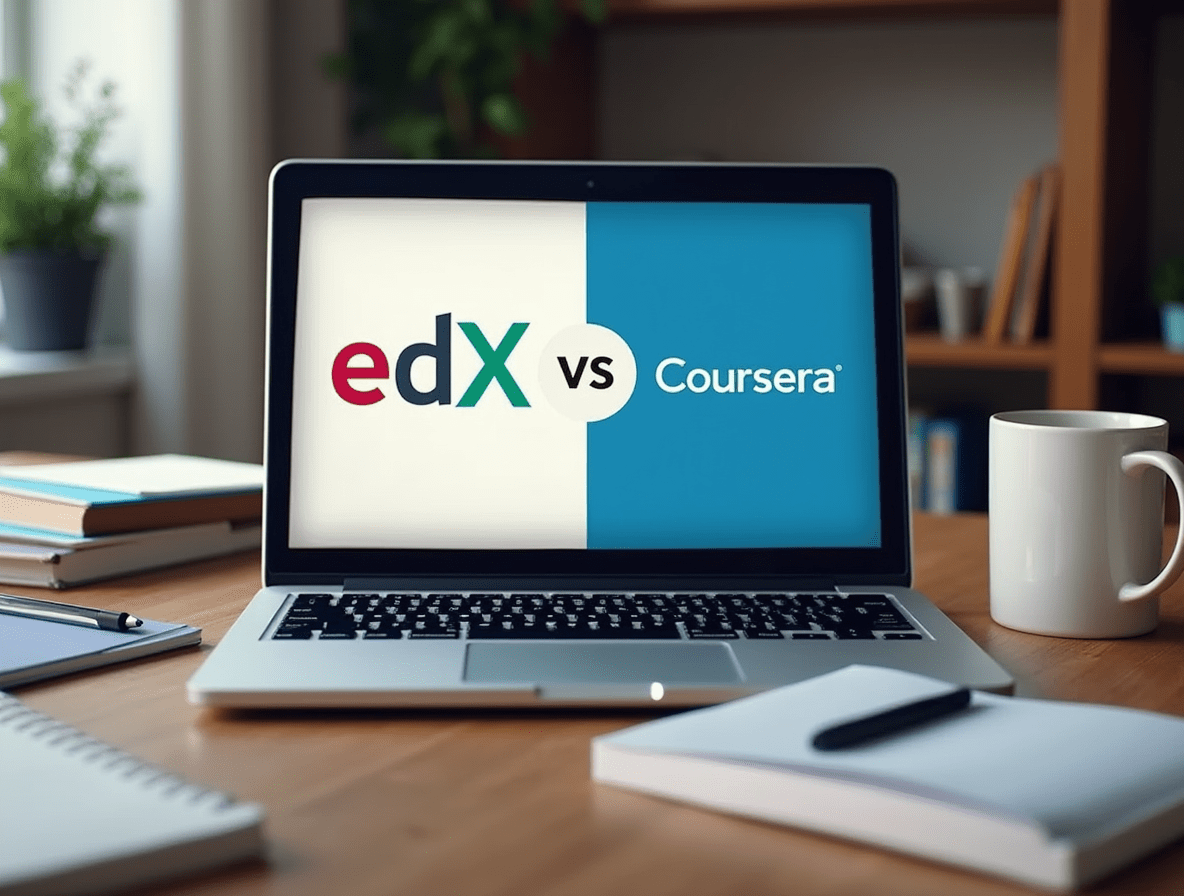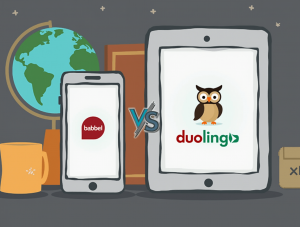
Which Online Education Platform Offers More Value?
Did you know that over 220 million learners worldwide enrolled in online courses in 2023? As remote learning becomes increasingly mainstream, platforms like edX and Coursera have transformed from convenient alternatives to powerful educational forces in their own right.
If you’re looking to enhance your skills, switch careers, or simply pursue knowledge, choosing between these two major platforms represents a significant investment of your time and money. Both edX and Coursera partner with prestigious universities and organizations, but they offer notably different approaches to online education.
In this comprehensive comparison, we’ll analyze what truly matters: course quality, cost effectiveness, credential value, learning experience, and career impact. By the end, you’ll understand exactly which platform delivers more value based on your specific educational goals, budget constraints, and learning preferences.
The Evolution of Online Education Platforms
Brief History and Background
Before diving into our detailed comparison, it’s helpful to understand the origins of these educational powerhouses:
edX was founded in 2012 as a nonprofit collaboration between Harvard University and MIT with a mission to increase access to high-quality education for everyone. In 2021, edX was acquired by 2U, a for-profit educational technology company, though it maintains its original educational philosophy.
Coursera launched in 2012 as a for-profit venture by Stanford University computer science professors Andrew Ng and Daphne Koller. The platform quickly expanded through partnerships with elite universities and corporations worldwide.
Both platforms emerged from prestigious academic institutions with the goal of democratizing education, but their business models and approaches have evolved differently over time.
Course Offerings and Academic Partnerships
edX’s Academic Ecosystem
edX partners with over 160 prestigious institutions including:
- Harvard University
- Massachusetts Institute of Technology (MIT)
- University of California, Berkeley
- Boston University
- Georgia Tech
- The University of Texas System
The platform offers approximately 3,600+ courses across disciplines including:
- Computer Science and Programming
- Business and Management
- Data Science and Analytics
- Humanities and Social Sciences
- Engineering
- Natural Sciences
Coursera’s Academic Network
Coursera boasts partnerships with 275+ leading universities and companies including:
- Stanford University
- Yale University
- University of Michigan
- IBM
- Meta (formerly Facebook)
The platform features 7,000+ courses spanning:
- Technology and Computer Science
- Business and Leadership
- Data Science
- Health and Medicine
- Arts and Humanities
- Personal Development
Comparative Analysis of Course Variety
While Coursera offers nearly twice as many courses as edX, quantity isn’t the only consideration. edX tends to focus more on rigorous academic content, while Coursera offers a broader mix of academic and industry-specific training. This distinction creates different value propositions depending on your goals:
- For academic depth: edX’s courses often feature more comprehensive academic content
- For industry relevance: Coursera’s corporate partnerships provide cutting-edge professional skills
Pricing Models and Cost Considerations
edX’s Pricing Structure
edX employs a “freemium” model with several options:
Free Access:
- Audit courses without certification
- Access to course materials and videos
- No graded assignments or certificates
Verified Certificates:
- $50-$300 per individual course
- Full course access including graded assignments
- Shareable certificate upon completion
MicroMasters Programs:
- $600-$1,500 for program series
- Graduate-level courses that can count toward select master’s degrees
- Professional credential recognition
Online Master’s Degrees:
- $10,000-$25,000 full program cost
- Fully accredited graduate degrees
- Significantly lower cost than on-campus alternatives
Coursera’s Pricing Approach
Coursera offers a multi-tiered pricing model:
Free Access:
- Limited access to select course materials
- Typically excludes graded assignments and certificates
Coursera Plus Subscription:
- $59/month or $399/year
- Unlimited access to 90% of the catalog
- Includes certificates for all completed courses
Individual Course Certificates:
- $39-$99 per course
- Complete course access with certificate
- Financial aid available
Specializations:
- $39-$99/month (subscription model)
- Focused skill development across multiple courses
- Projects and certificates included
Professional Certificates:
- $39-$99/month (subscription model)
- Industry-recognized credentials
- Often designed by companies like Google and IBM
Online Degrees:
- $15,000-$45,000 full program cost
- Bachelor’s and Master’s degree options
- Accredited programs from partner universities
Value Analysis of Pricing Models
The better value depends largely on your learning patterns:
- For exploratory learners: Coursera Plus subscription provides more bang for your buck if you complete multiple courses per year
- For focused, single-course study: edX’s one-time payment model may be more economical
- For degree seekers: edX typically offers more affordable graduate degree options
Learning Experience and Platform Features
edX User Experience
Course Structure:
- Structured weekly modules
- Emphasis on academic rigor and comprehensive coverage
- More demanding assessments and projects
Platform Interface:
- Clean, minimalist design
- Well-organized course materials
- Focus on educational content over social features
- Consistent course layout across institutions
Learning Tools:
- Interactive problem sets
- Peer-reviewed assignments
- Discussion forums
- Virtual laboratories for select science courses
Coursera User Experience
Course Structure:
- Flexible deadlines with recommended schedules
- Varied content depth depending on provider
- Mix of theoretical and practical applications
Platform Interface:
- Modern, intuitive design
- Progress tracking dashboard
- Community features and learner networks
- Mobile-optimized experience
Learning Tools:
- Auto-graded assignments
- Peer feedback systems
- Active discussion forums
- Interactive quizzes and assessments
- Programming environments for technical courses
Comparative Learning Experience Analysis
User experience preferences often align with learning styles:
- For structured learners: edX’s consistent academic approach provides clear pathways
- For flexible learners: Coursera’s adaptable deadlines and mobile optimization offer convenience
- For social learners: Coursera’s stronger community features facilitate peer connections
- For independent learners: edX’s comprehensive materials support self-directed study
Credential Value and Recognition
edX Credentials
Verified Certificates:
- Include university branding
- Verify identity but not equivalent to university credit
- Respected but primarily for knowledge demonstration
XSeries Certificates:
- Recognize completion of series of related courses
- Demonstrate more substantial subject mastery
- More valuable than individual certificates
MicroMasters:
- Graduate-level credential
- Can count as credit toward select master’s degrees
- Recognized by certain employers and universities
- Significant academic weight
Professional Certificates:
- Focus on career-relevant skills
- Developed by industry leaders and universities
- Recognition varies by industry
Online Degrees:
- Identical to on-campus degrees (no “online” designation)
- Fully accredited
- Maximum credential value
Coursera Credentials
Course Certificates:
- Include university or company branding
- Verify completion but not university credit
- Widely shareable on platforms like LinkedIn
Specialization Certificates:
- Demonstrate mastery across multiple related courses
- More substantial than single course certificates
- Often includes capstone projects
Professional Certificates:
- Developed by industry leaders like Google and IBM
- Focus on job-ready skills
- Growing recognition among employers
MasterTrack Certificates:
- Portions of Master’s programs
- Can count toward degree completion
- Higher credential value than specializations
Online Degrees:
- Identical to traditional degrees
- Fully accredited
- No distinction from on-campus credentials
Credential Value Analysis
The credential value comparison reveals important distinctions:
- For academic recognition: edX’s MicroMasters typically carry more academic weight
- For industry recognition: Coursera’s Professional Certificates from companies like Google often have more direct industry relevance
- For career transitioning: Both platforms offer valuable credentials, but Coursera’s broader industry partnerships may provide an edge in certain fields
- For academic advancement: edX has stronger pathways from certificates to academic credit
Career Impact and Outcomes
edX Career Benefits
Skills Development:
- Strong foundation in theoretical knowledge
- Academic approach develops critical thinking
- Rigorous assessments ensure genuine competency
Career Services:
- More limited than Coursera
- Focus on educational content over career placement
- Some resume-building resources and advice
Employment Outcomes:
- Strong recognition for technical fields
- Valuable for academic career advancement
- Growing recognition among employers
Coursera Career Benefits
Skills Development:
- Blend of theoretical and practical knowledge
- Often includes hands-on projects
- Industry-aligned skill development
Career Services:
- Career guidance resources
- Resume-building tools
- Job search features
- Some employer connections
Employment Outcomes:
- Strong recognition for certificates from corporate partners
- Direct pathways to certain tech companies
- Wide acceptance on LinkedIn and professional profiles
Comparative Career Impact Analysis
Career impact considerations vary by field and goal:
- For academic careers: edX’s university-focused approach often provides better alignment
- For corporate advancement: Coursera’s industry partnerships offer more direct relevance
- For technical roles: Both platforms are well-respected, with specific advantages depending on the technology
- For career changers: Coursera often provides more comprehensive career transition support
Ideal User Profiles: Who Gets More Value From Each Platform?
Who Should Choose edX?
Academic Purists If you value depth of understanding and academic rigor, edX’s university-centric approach typically provides more comprehensive educational experiences. The platform maintains higher academic standards across its offerings.
Budget-Conscious Degree Seekers For those pursuing full graduate degrees online, edX typically offers more affordable master’s programs while maintaining prestigious university partnerships and full accreditation.
Structured Learners If you prefer clearly defined learning paths with rigorous assessments, edX’s more traditional academic structure provides clear guidelines and expectations.
Credit Seekers For learners hoping to apply online learning toward future academic pursuits, edX’s MicroMasters and credit pathways offer stronger bridges to formal degree programs.
Who Should Choose Coursera?
Continuous Learners If you regularly take multiple courses across various subjects, Coursera Plus subscription offers exceptional value compared to paying for individual courses.
Corporate Skill Builders For professionals seeking specific industry-recognized credentials, Coursera’s partnerships with companies like Google, IBM, and Meta provide directly relevant training and credentials.
Flexibility Prioritizers If fitting education around a busy schedule is crucial, Coursera’s more flexible deadlines and mobile-optimized platform make learning more accessible.
Practical Application Focused For those who prefer learning by doing rather than theoretical knowledge, Coursera’s emphasis on projects and practical applications often provides better skill development.
Implementation Strategies for Maximum Value
Getting the Most From edX
- Try Before You Buy: Audit courses before purchasing certificates to ensure they meet your needs.
- Look for Credit Pathways: If academic advancement is your goal, focus on courses that can count toward degrees.
- Set a Structured Schedule: edX courses work best when you maintain a consistent study schedule.
- Engage With Forums: While less emphasized than on Coursera, edX’s forums provide valuable academic discussions.
- Focus on Completing Series: XSeries and MicroMasters provide much more value than individual courses.
Maximizing Coursera Value
- Calculate Subscription Benefits: If taking more than 6-7 courses annually, Coursera Plus typically offers better value.
- Prioritize Industry-Partner Content: For career advancement, courses from companies often provide more direct skill application.
- Utilize Peer Review: Actively participate in peer assessment to deepen understanding.
- Build Learning Pathways: Create your own curriculum across related specializations for comprehensive skill development.
- Leverage Career Resources: Take advantage of Coursera’s career tools and guidance features.
Conclusion: Defining “Value” in Online Education
The question of which platform offers more value cannot be answered universally—it depends entirely on how you define value in your educational journey.
edX delivers superior value for learners seeking academic depth, credential pathways to degrees, structured learning environments, and more affordable graduate programs. Its nonprofit origins and focus on educational mission rather than commercial interests often result in more academically rigorous content.
Coursera provides better value for continuous learners who benefit from subscription pricing, professionals seeking industry-specific skills, learners needing flexibility, and those who value extensive course variety. Its corporate partnerships and practical focus often create more direct career application.
Rather than declaring one platform universally superior, consider these questions to determine which offers more value for you:
- What are your primary educational goals? (Academic knowledge vs. practical skills)
- How many courses do you plan to take annually? (Subscription vs. individual purchase)
- Do you prefer structured or flexible learning environments?
- Are you seeking academic credit or industry recognition?
- Which specific courses or programs interest you most?
Both platforms continue to evolve, with edX expanding its professional offerings and Coursera strengthening its academic credentials. For many learners, the highest value approach might involve strategically utilizing both platforms based on their respective strengths.
Whichever platform you choose, the true value comes not from the platform itself, but from how effectively its resources align with your educational goals and learning preferences.
FAQ Section
Can I get financial aid on edX and Coursera?
Both platforms offer financial assistance, but through different mechanisms. edX provides financial assistance for individual course certificates, typically discounting 90% of the cost for qualified applicants. Coursera offers financial aid that covers 100% of course costs for those who demonstrate need, though the application process requires a detailed explanation and can take 15 days for approval.
Do employers recognize certificates from these platforms?
Recognition varies by industry and employer, but both platforms have gained significant credibility. Coursera certificates from corporate partners like Google and IBM often have direct industry recognition. edX’s MicroMasters and professional certificates are increasingly recognized, particularly in technical fields and academia.
Can I transfer credits from these platforms to traditional degree programs?
edX has more established credit transfer pathways, particularly through its MicroMasters programs which can count toward specific master’s degrees at partner institutions. Coursera’s credit transfer options are more limited, though some MasterTrack certificates can apply to partner university degrees. Always check with your target institution before assuming credits will transfer.
Which platform is better for career changers?
Career changers often find Coursera’s industry partnerships and Professional Certificates provide more direct pathways into new fields, particularly in technology. However, edX’s MicroMasters can provide stronger foundations for career changes requiring academic credentials. The better choice depends on your specific target industry.
Is it worth paying for certificates or should I just audit courses?
Certificates provide value through credential verification, motivation to complete courses, and professional documentation of your skills. They’re worth the investment if you plan to use them professionally or need external accountability. Auditing makes sense for personal interest topics or when testing whether a subject area interests you before committing financially.
Can I download course materials for offline use?
Coursera’s mobile app allows downloading videos for offline viewing with a paid enrollment. edX’s offline capabilities are more limited, typically requiring paid enrollment and only supporting video downloads on mobile devices. Neither platform allows comprehensive downloading of all course materials due to intellectual property considerations.














